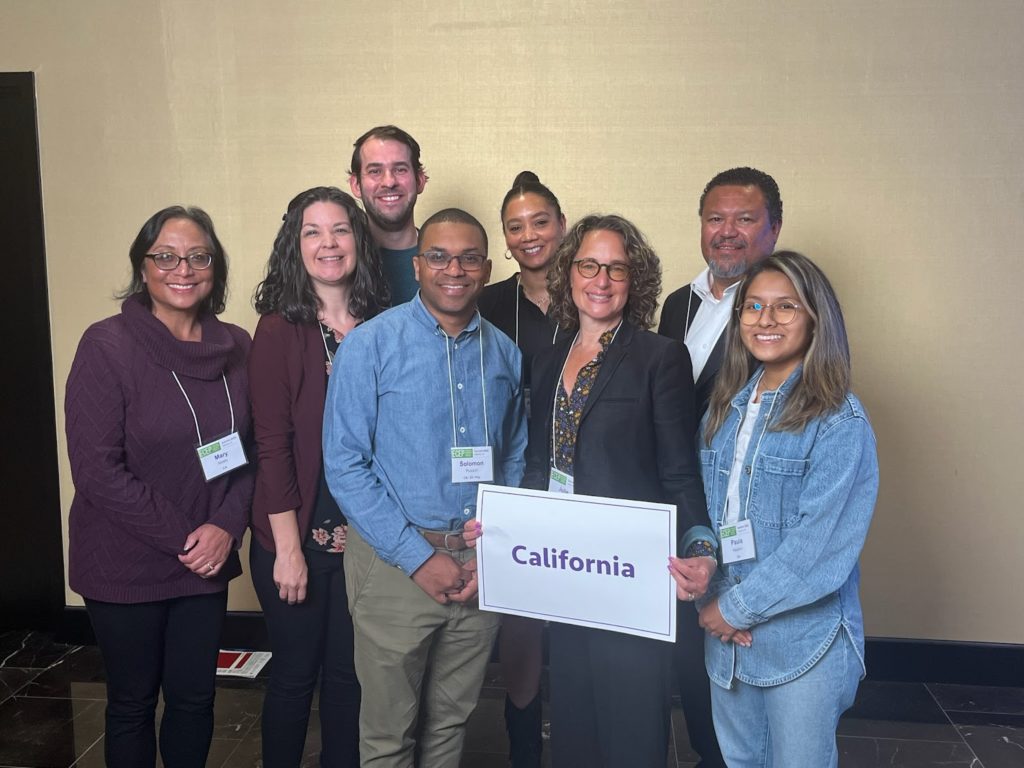
On May 1-3, 2023, the UCLA CS Equity Project and California ECEP team attended the Expanding Computing Education Pathways (ECEP) Alliance 2023 Conference in Oakland, California. Julie Flapan, co-director of CSforCA, moderated the invited panel session, “CSforCA Model of Collective Impact: A Systems Approach to Operationalizing Equity in Computer Science Education in California” with representatives from each of the five CSforCA working groups including the Research and Communications Working group, Allison Scott (CEO of the Kapor Center), Katherine Goyette (CS Coordinator at the California Department of Education), Solomon Russell (CS Department Chair at El Camino College) of the Higher Education Working Group, Vince Stewart (Children Now, CA STEM Network) of the Coalition Working Group, Bryan “BT” Twarek (Director of Education at CSTA) of the K12 Teaching and Learning Working Group, and Paula Nazario (Assistant Director at UCLA CS Equity Project) of the Policy Working Group.
The panelists modeled the diverse perspectives they share in our collective impact model of CS education – where local efforts inform state policy and conversely, state policy supports local efforts. For example, CSforCA co-Director Allison Scott introduced our data dashboard and how it has helped to guide advocacy efforts by identifying equity gaps and targeting policies and resources to expand access and engagement. With this data, CSforCA is able to provide research and technical assistance to build the capacity of stakeholders and elected officials to make evidence-based decisions around bills such as AB 1251 (Assemblymember Luz Rivas) and AB 1054 (Assemblymember Marc Berman). Panelists also discussed how the CSforCA model has amplified the voices of practitioners and led to the creation of policy, coalition-building, research and communication, teaching and learning, and higher education working groups.
The ECEP Alliance also welcomed seven new states (Illinois, Iowa, Kentucky, Maine, New Mexico, Pennsylvania, and Wisconsin) to the ECEP membership, now totaling 29 states. Throughout the conference, state teams had the opportunity to meet up and discuss their state priorities and develop timelines to ensure that goals are met throughout the year. The event was also an opportunity for states to learn together, sharing successes and challenges with other states experiencing different strategies and experiences. The California team discussed the possibility of expanding opportunities in data science and family, community, and student engagement, and creating a CSforCA working group focused on parent and community engagement. ECEP held many sessions that focused on building equity in CS and the implications of statewide restrictions on equity and how to respond to different political contexts. Overall, conference attendees shared meaningful conversations around different programs and resources like Strategies for Effective and Inclusive CS Teaching, SCRIPT, and others that challenge our community to incorporate the ethics of computer science, algorithmic bias, and misinformation, and dig deep into insightful questions about equity, accountability and scalability in advancing equity in CS education.
ECEP was a great success – and an exciting opportunity to learn more about future opportunities for computing in California. The panelists are grateful to have had the opportunity to represent CSforCA and share in the great work taking place across the state!